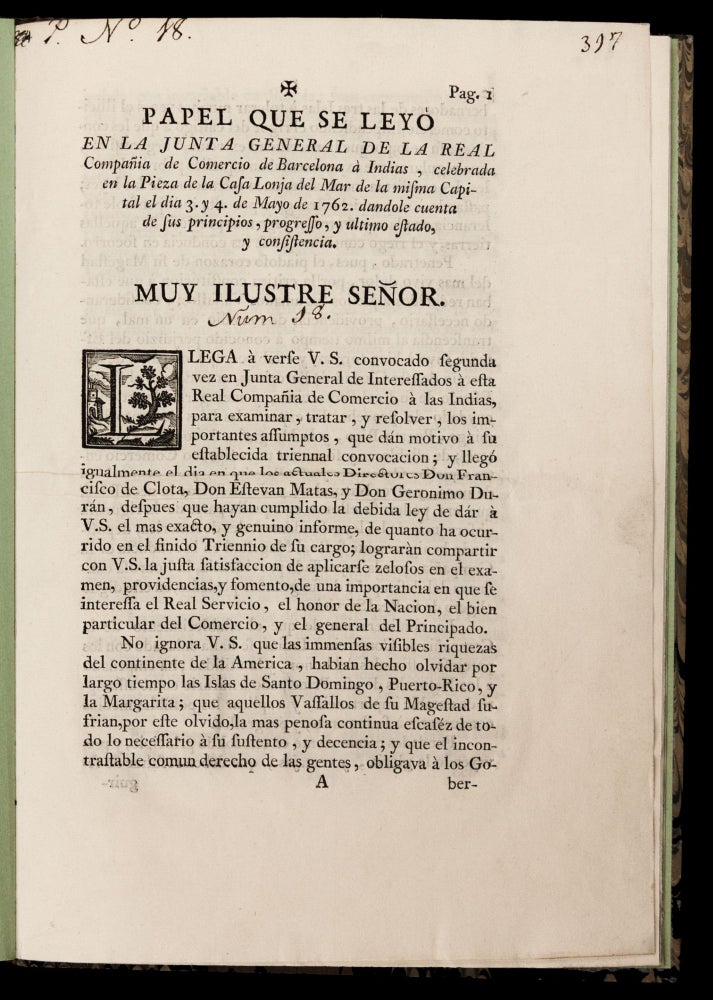Papel que se leyó en la junta general de la Real Compãnia de Comercio de Barcelona à Indias, celebrada en la Pieza de la Casa Lonja del Mar de la misma Capital….
Folio [28.4 x 19.8 cm], 20 pp., with a woodcut initial. Bound in recent marbled boards. Binding well preserved. Leaves with contemporary manuscript foliation, the occasional very minor marginal stain, otherwise remarkably well preserved. Very rare first and only edition of an official document providing an insider’s view of 18th-century Catalan trade with Puerto Rico, Santo Domingo and Margarita Island, with information on both “the immense visible riches of the continent of America” (p. 1) and the use of slaves to support Spanish ventures in America (p. 19). The report records the agenda of the triennial board meeting of the Real Compañia de Comercio de Barcelona à Indias (Royal Barcelona West Indies Trading Company), which was held at Barcelona’s Casa Lonja del Mar in May of 1762. Chartered in 1755, the Barcelona Trading Company was one of a handful of private trade companies to America supported by Spain’s reformist Bourbon monarchs as a means to modernize transatlantic commerce, and it marked an important formal return of Barcelona to the Americas trade after having been shut out for more than 250 years by the monopolies in Seville and Cadiz. The document treats each of the Barcelona Trading Company’s voyages over the previous three years, giving precise information on ships and captains, cargos, profits and losses, destinations, unforeseen engagements at sea, and shipwrecks. Ships outbound from Barcelona carried products from the city’s newly established textile industry, including linen, silk, lace, sombreros, Indianas (chinz or printed calico), and ribbons woven with gold and silver treads. The monopoly granted to the Barcelona Trading Company to operate in Puerto Rico, Santo Domingo and Margarita Island allowed the Catalans to exchange these goods for silver, sugar, and pearls, while restricted access to Guatemala, Honduras and Cumaná (Venezuela) allowed for the importation of other raw materials, such as “indigo from Guatemala” (p. 7) for use in textile mills in Spain. The document is especially concerned with problems encountered in the sugar trade, as their unrefined product was not meeting the standards of Spanish consumers. Considerations are given to the possibility of improving and expanding sugar mills in the Company’s territories, a prospect which board members note would require “el envio de Negros à las Islas” (19). The Barcelona Trading Company’s board also discusses difficulties in business arising from smuggling and from the outbreak of the Anglo-Spanish War in 1762, including the diverting of shipments and the mid-journey requisitioning of a vessel at the news of the commencement of hostilities in January of that year. (At the conclusion of the war in 1763, Spain would cede Florida to Britain in exchange for Havana and would receive Louisiana from France.) Having interrupted the monopoly of Cadiz, the Barcelona Trading Company represents an important step toward the establishment of free trade in the Americas, but the further expansion of unrestricted commerce would soon lead to the unraveling of its own monopoly in Puerto Rico, Santo Domingo and Margarita Island and eventually to the Company’s dissolvement in 1784-85. The present document was printed in small numbers for presentation to relevant officials serving the Spanish Crown, in accordance with the Company’s 1755 charter. The text is rather conversational in tone and notes that an official numerical leger of profits and losses would be submitted in manuscript at a later date. Such commercial reports, having been produced for limited distribution, are today very rare. OCLC and KVK record only three copies of this very rare work (John Carter Brown, Biblioteca de Catalunya, and Universitat de Barcelona). * María del Carmen Simón Palmer, Bibliografía de Cataluña, p. 277, no. 2255; V. Léon Sanz and N. Guasti, “The Treaty of Asiento between Spain and Great Britain,” in A. Alimento and K. Stapelbroek, eds., The Politics of Commercial Treaties in the Eighteenth Century: Balance of Power, Balance of Trade, pp. 151-72; José María Oliva Melgar, Cataluña y el comercio privilegiado con América en el siglo XVIII: La Real Compañia de Comercio de Barcelona à Indias.
Sold


